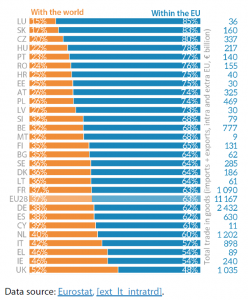The single market is generally considered to be the cornerstone of the EU economy and one of the greatest achievements of the European Union. Comprising nearly 450 million people and 20 million enterprises, it constitutes the largest integrated market in the world, worth €14 trillion in 2018. By removing barriers to trade, safeguarding fair competition, attracting investment and boosting efficiency and economies of scale, the single market has been fundamental in improving the competitiveness of EU companies. Even though the EU has less than 7 % of the world’s population, its trade with the rest of the world accounts for more than 15 % of global imports and exports.
Multiple studies have measured the effects of the single market on the EU economy. Quantifications of the benefits vary, but are overwhelmingly positive. A 2019 study suggested that EU citizens’ per capita welfare gains from the single market amount to €840 annually. Also in 2019, the European Commission estimated that, mainly due to the removal of tariff and non-tariff barriers to trade, EU GDP is 8-9 % higher than if the single market did not exist. Furthermore, in 2020 the ECB calculated that the single market has raised real GDP per capita by between 12 % and 22 % since its inception.








Be the first to write a comment.